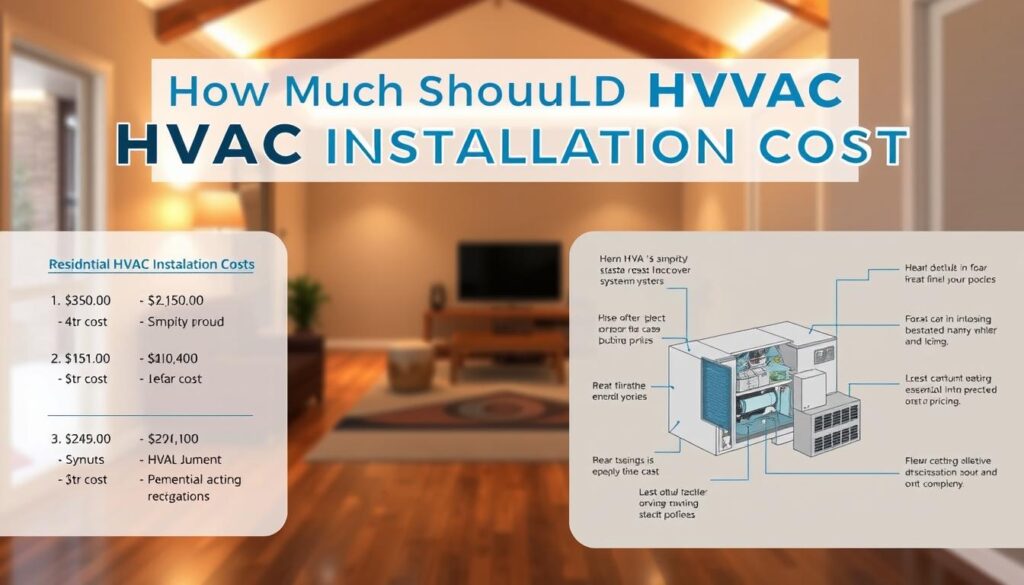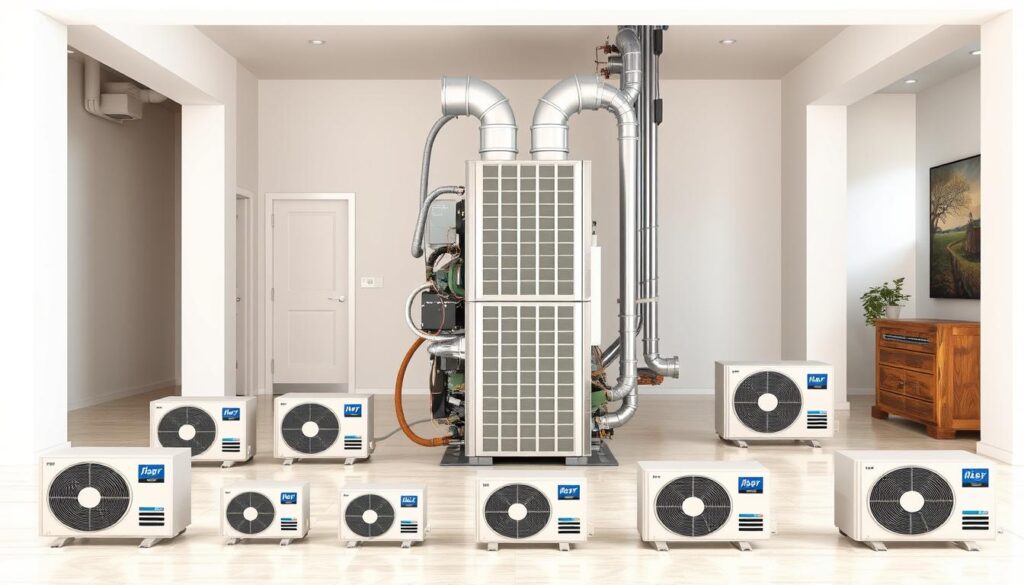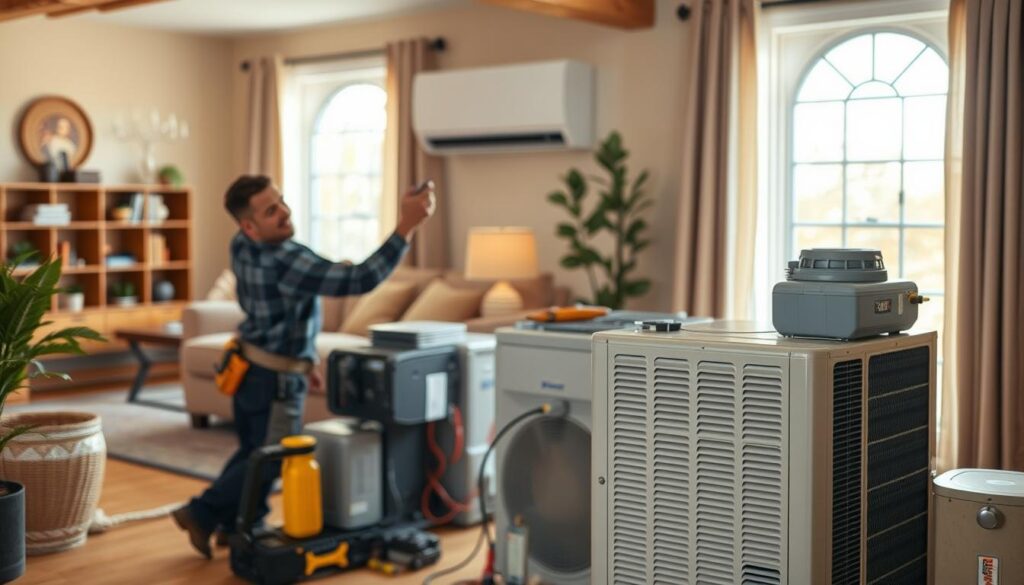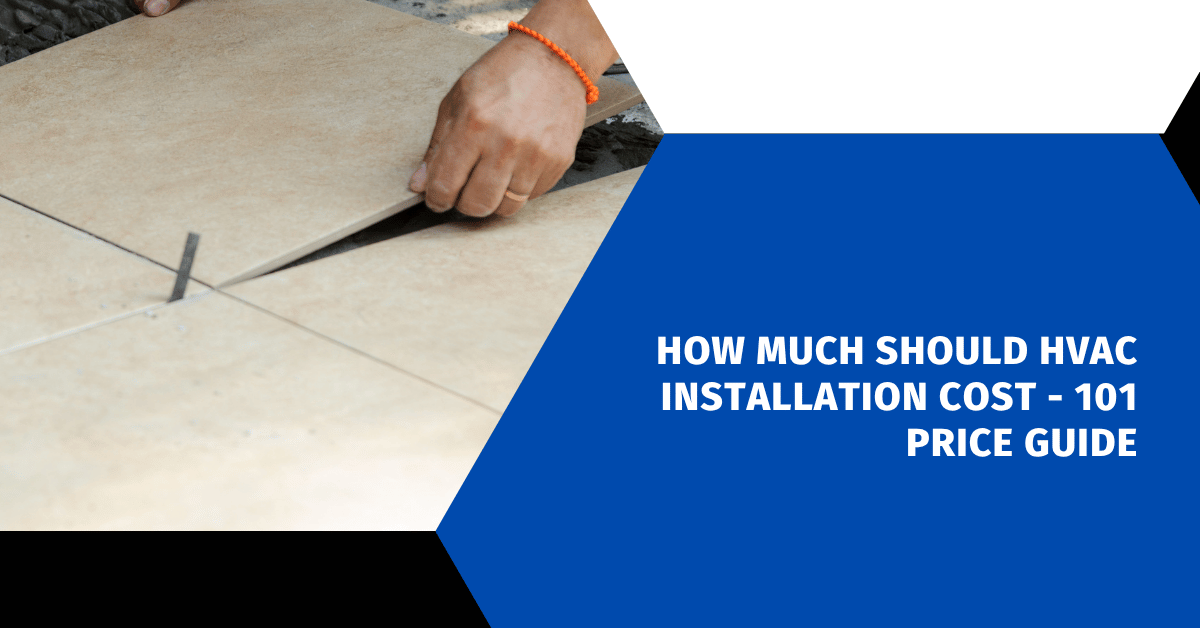How Much Should HVAC Installation Cost? Are you curious about the cost of a new HVAC system for your home? Knowing the average price can help you plan your budget. It ensures you make smart choices for your home’s comfort.
Affiliate Disclosure
HVAC Guide Guys is a participant in the Amazon Services LLC Associates Program, an affiliate advertising program designed to provide a means for sites to earn advertising fees by advertising and linking to Amazon.

Getting a new HVAC system is a big deal for homeowners. The cost usually falls between $5,000 and $12,500. This depends on how complex the system is, your home’s size, and the quality of the equipment.
Several key factors affect your total cost. These include the type of system, your home’s size, local labor rates, and the HVAC unit’s efficiency. Understanding these can help you save money during installation.
Key Takeaways
- Average HVAC installation costs range from $5,000 to $12,500
- Multiple factors influence the total installation price
- Home size and system efficiency impact overall expenses
- Professional assessment is key for accurate pricing
- Energy-efficient systems may offer long-term savings
Table of Contents
Understanding HVAC System Basics
Your home’s comfort relies on a complex system. It does more than just heat and cool. An HVAC system controls temperature, humidity, and air quality with great precision. Knowing how HVAC systems work can help you choose the best for your home.
Today’s HVAC systems are advanced networks of equipment. They aim to create the perfect indoor climate. The cost of an HVAC unit varies based on its complexity and components.
What is an HVAC System?
An HVAC system is a complete solution for:
- Heating your home in winter
- Cooling it in summer
- Circulating and filtering indoor air
- Managing humidity levels
Components of a Complete HVAC System
A typical HVAC system has several key parts:
| Component | Primary Function |
|---|---|
| Furnace | Generates heat for winter months |
| Air Conditioner | Provides cooling during summer |
| Ductwork | Distributes heated or cooled air throughout home |
| Thermostat | Controls temperature and system operation |
Types of HVAC Units Available
When looking at HVAC systems for your home, you’ll find several types:
- Split Systems: Most common residential setup
- Packaged Systems: Compact units for smaller spaces
- Ductless Mini-Split Systems: Flexible cooling and heating solution
- Geothermal Systems: Energy-efficient ground-source options
“Choosing the right HVAC system is about balancing comfort, efficiency, and budget.” – HVAC Industry Expert
Each system type has different costs and installation needs. Your home’s size, climate, and needs will help pick the best one.
Explore Our HVAC Shop
Looking for top-rated HVAC tools, parts, and accessories? Visit our shop and find the perfect solution for your needs.
Visit the ShopAverage HVAC Installation Costs by System Type
When planning a new HVAC system, knowing the costs for different types is key. Each system has its own benefits and installation prices vary.
Central air conditioners are a favorite among homeowners. The cost to install one is usually between $3,500 and $8,500. Prices can change based on:
- Unit size and capacity
- Home square footage
- Energy efficiency ratings
- Local labor rates
Heat pumps offer both heating and cooling. Their installation costs range from $4,000 to $10,000. They work well in mild climates by moving heat, not making it.
Furnace installations are also important. Costs vary from $3,000 to $6,500, depending on the fuel and system complexity. Gas furnaces are pricier but more efficient than electric ones.
“Investing in the right HVAC system can save you money long-term through improved energy efficiency and reduced maintenance costs.”
Your HVAC system cost will depend on several factors. These include your home’s size, current setup, and local climate. Getting advice from a pro can help you choose the best system for your home.
How Much Should HVAC Installation Cost
Understanding the cost of HVAC replacement helps you plan your budget for home comfort. The total cost of HVAC installation breaks down into three main parts. These parts affect the overall cost you’ll pay.
- Equipment: 60% of total cost
- Labor: 30% of total cost
- Permits and Additional Expenses: 10% of total cost
Labor Costs Breakdown
HVAC contractor rates change based on several factors. Skilled technicians charge between $75 to $250 per hour. This depends on their skills and the local market.
The complexity of your installation and the time needed also affect labor costs.
Equipment Cost Factors
When looking at hvac replacement cost, consider these important factors:
- System efficiency ratings
- Size and capacity of the unit
- Brand reputation
- Advanced technological features
“Your HVAC system is an investment in home comfort and energy efficiency.” – HVAC Industry Expert
Additional Installation Expenses
There might be extra costs beyond basic installation. These include:
- Permit fees
- Ductwork modifications
- Electrical system upgrades
- Removal of old equipment
Working with a professional HVAC contractor helps estimate costs accurately. They ensure your HVAC system is installed correctly, saving you money in the long run.
Explore Our HVAC Shop
Looking for top-rated HVAC tools, parts, and accessories? Visit our shop and find the perfect solution for your needs.
Visit the ShopCost Factors Based on Home Size

Your home’s size is key in figuring out HVAC installation costs. Different sizes need different HVAC systems, affecting your total cost. It’s important to know how size affects your investment.
Smaller homes need less powerful HVAC systems, which means lower costs. For example, a 1,000-square-foot home costs less than a 2,500-square-foot one.
- 1,000-square-foot home: Lowest installation costs
- 1,500-2,000-square-foot home: Mid-range system requirements
- 2,500+ square-foot home: Most complex and expensive installations
Several factors affect HVAC system size:
- Total square footage
- Ceiling height
- Home insulation quality
- Number of windows and doors
- Local climate conditions
| Home Size | Estimated HVAC Installation Cost | System Capacity |
|---|---|---|
| 1,000 sq ft | $2,500 – $4,500 | 2-3 tons |
| 1,500 sq ft | $3,500 – $6,000 | 3-4 tons |
| 2,000 sq ft | $4,500 – $7,700 | 4-5 tons |
| 2,500+ sq ft | $6,000 – $10,000 | 5-6 tons |
Pro tip: Always consult a professional HVAC technician to get an accurate assessment for your specific home’s requirements.
HVAC Installation Costs by Brand
Choosing the right HVAC brand can greatly affect your new hvac system cost. Different brands offer various qualities, performances, and prices. This meets the needs of different homeowners.
When looking at hvac unit cost, you’ll find three main brand types: premium, mid-range, and budget-friendly. Each type has its own benefits and price ranges to think about.
Premium Brands: Top-Tier HVAC Performance
Premium brands like Carrier, Lennox, and Trane are at the top of HVAC technology. They offer top-notch quality with advanced features:
- Higher energy efficiency ratings
- Extended warranty coverage
- Cutting-edge technological innovations
- Superior durability and performance
Expect to spend 15-30% more for these high-end systems compared to standard options.
Mid-Range Options: Balanced Performance
American Standard and Bryant offer reliable HVAC solutions at more moderate prices. These brands provide:
- Solid performance
- Reasonable efficiency
- Competitive pricing
- Reliable manufacturing standards
Budget-Friendly Choices: Affordable Comfort
Goodman and Amana focus on cost-effective HVAC systems. While more affordable, these brands offer consistent home comfort:
- Lower upfront costs
- Basic efficiency ratings
- Straightforward installation
- Suitable for budget-conscious homeowners
Your ideal brand depends on your specific budget, home size, and long-term comfort goals.
Energy Efficiency Ratings and Cost Impact
Knowing about energy efficiency ratings is key when looking at hvac replacement costs. These ratings affect both the initial cost and your long-term energy bills. Even though high-efficiency units might be pricier at first, they can save you a lot of money later on.
HVAC systems have two main efficiency ratings:
- SEER (Seasonal Energy Efficiency Ratio) – Shows how well air conditioning works
- AFUE (Annual Fuel Utilization Efficiency) – Measures how well a furnace heats
Here’s how these ratings affect your investment:
| Efficiency Rating | Initial Cost | Annual Energy Savings |
|---|---|---|
| 80% AFUE Furnace | $4,500 | Standard Efficiency |
| 96% AFUE Furnace | $7,500 | Up to 16% Lower Energy Costs |
Higher SEER and AFUE ratings mean better technology that uses less energy. Even though you’ll pay more upfront, you’ll save money on your bills.
“Investing in high-efficiency HVAC systems is like putting money back in your pocket every month.” – HVAC Energy Experts
When thinking about hvac installation costs, remember the long-term savings. A more efficient system can cut energy use by 20-30%. This makes the initial cost worth it.
Explore Our HVAC Shop
Looking for top-rated HVAC tools, parts, and accessories? Visit our shop and find the perfect solution for your needs.
Visit the ShopDuctwork Installation and Modification Costs
Ductwork is key to your HVAC system’s performance. Knowing the costs for installation and changes helps with budgeting for your HVAC project.
The cost of ductwork installation changes based on several factors. Your home’s size, layout, and current setup greatly affect the cost.
New Ductwork Installation Pricing
Prices for new ductwork vary based on your needs:
- Residential ductwork: $1,000 – $5,000
- Commercial HVAC installation ductwork: $3,000 – $10,000
- Complex architectural designs: Up to $15,000
Repair vs. Replacement Strategies
Depending on its state, your ductwork might need different actions:
- Minor repairs: $500 – $1,000
- Partial duct replacement: $1,500 – $3,500
- Complete duct system replacement: $5,000 – $15,000
Material Cost Considerations
Ductwork materials also affect the cost:
- Flexible ductwork: Most affordable option
- Sheet metal ducts: Mid-range pricing
- Fiberglass ductboard: Moderate cost with good insulation
Getting a professional’s opinion is key to finding the best solution for your HVAC needs.
Seasonal Timing and Installation Costs

Timing is everything when it comes to HVAC installation. Knowing when prices change can help you save a lot. This is true for both hvac contractor rates and furnace installation prices.
Smart homeowners understand how the season affects costs. Prices go up during busy times and down when it’s slower.
- Air conditioning installations are cheapest from October to March
- Furnace installations are most affordable from March to September
- Off-season installations can reduce costs by 10-20%
Contractors have more time and lower demand in off-peak seasons. This means they can offer better prices for your HVAC system.
Here are some tips for choosing the right time:
- Schedule AC installation during winter months
- Plan furnace upgrades during late spring or early fall
- Request multiple quotes to compare seasonal rates
By planning your HVAC installation wisely, you can save hundreds. And your home will stay comfortable all year.
Explore Our HVAC Shop
Looking for top-rated HVAC tools, parts, and accessories? Visit our shop and find the perfect solution for your needs.
Visit the ShopWays to Save on HVAC Installation
It’s not hard to cut down on hvac installation costs. Smart homeowners can use many ways to make their ac unit installation more affordable.
To save on your HVAC system, you need a plan and to know about financial help. Learning how to cut costs can make a big difference in your spending.
Tax Credits and Rebates
The government gives big incentives for energy-saving HVAC systems. You might get tax credits that cut your costs a lot.
- Federal tax credits up to $500 for energy-efficient systems
- State rebates for green HVAC installations
- Utility company bonuses for efficient units
Financing Options
There are many ways to pay for hvac installation without spending too much:
- Financing from manufacturers
- Home improvement loans
- Grants for energy-saving home upgrades
Maintenance Plans
Getting a maintenance plan can save you money on repairs and make your system last longer. Many contractors offer deals that can save you a lot over time.
“A well-maintained HVAC system can reduce energy costs by up to 15% annually.” – Energy Star Recommendation
By using these tips, you can lower your ac unit installation cost. This way, you’ll save money in the long run on keeping your home comfortable.
Conclusion
Knowing how much an HVAC installation costs is key for homeowners looking to upgrade. A new HVAC system usually costs between $5,000 to $12,500. This is a big investment, but it’s worth it for your home’s comfort and efficiency.
When thinking about replacing your HVAC, remember it can greatly improve your home’s energy use. Researching different systems, installation costs, and savings can lead to a smart choice. This choice balances the initial cost with long-term benefits.
Your HVAC system is essential for your home’s comfort. Understanding prices, efficiency, and financing options helps you choose wisely. This way, you get a system that fits your budget and provides comfort for years.
Planning carefully and making informed decisions is important for HVAC installation. Take time to think about your needs, talk to professional contractors, and look into energy-saving options. This approach ensures you get the best value for your money.
FAQ
What is the average cost of a complete HVAC system installation?
How do home size and square footage affect HVAC installation costs?
What factors influence the total cost of HVAC installation?
Are there ways to save money on HVAC installation?
How long does a typical HVAC system installation take?
What is the difference between installation costs for central air, heat pumps, and furnaces?
How do energy efficiency ratings impact installation costs?
What additional expenses should I budget for during HVAC installation?
What is the average cost of a complete HVAC system installation?
How do home size and square footage affect HVAC installation costs?
What factors influence the total cost of HVAC installation?
Are there ways to save money on HVAC installation?
How long does a typical HVAC system installation take?
What is the difference between installation costs for central air, heat pumps, and furnaces?
How do energy efficiency ratings impact installation costs?
What additional expenses should I budget for during HVAC installation?
FAQ
What is the average cost of a complete HVAC system installation?
The cost of a complete HVAC system installation varies. It can be between ,000 and ,000. This depends on your home’s size, the type of system, and how complex the installation is. For a typical home, expect to pay around ,500 for a new HVAC system.
How do home size and square footage affect HVAC installation costs?
The size of your home affects the cost of HVAC installation. Bigger homes need more powerful systems. This means higher costs. Generally, you’ll need 20-30 BTUs per square foot, which increases with your home’s size and needs.
What factors influence the total cost of HVAC installation?
Several factors affect HVAC installation costs. These include the system type, brand, and your home’s size. The condition of your ductwork, energy efficiency ratings, and labor rates also play a role. Additional costs like permits, electrical upgrades, and complex installations can also increase the price.
Are there ways to save money on HVAC installation?
Yes, there are ways to save. Installing during off-peak seasons can be cheaper. Look for tax credits and rebates. Compare quotes from different contractors. Choosing mid-range efficiency systems and financing options can also help. Keeping your system in good shape and regular maintenance can lower costs over time.
How long does a typical HVAC system installation take?
Installing a typical HVAC system takes 1-3 days. The time depends on the project’s complexity. For a simple replacement in a typical home, it usually takes 1-2 days.
What is the difference between installation costs for central air, heat pumps, and furnaces?
Costs vary by system type. Central air systems cost between ,000 and ,000. Heat pumps are ,000 to ,000, and furnaces are ,500 to ,000. The final cost depends on efficiency, brand, and your home’s needs.
How do energy efficiency ratings impact installation costs?
Higher efficiency systems cost more upfront but save energy over time. A high-efficiency system might be 20-30% more expensive. But it can cut your energy bills by 10-15% each year.
What additional expenses should I budget for during HVAC installation?
You might need to budget extra for ductwork changes (
FAQ
What is the average cost of a complete HVAC system installation?
The cost of a complete HVAC system installation varies. It can be between $5,000 and $12,000. This depends on your home’s size, the type of system, and how complex the installation is. For a typical home, expect to pay around $7,500 for a new HVAC system.
How do home size and square footage affect HVAC installation costs?
The size of your home affects the cost of HVAC installation. Bigger homes need more powerful systems. This means higher costs. Generally, you’ll need 20-30 BTUs per square foot, which increases with your home’s size and needs.
What factors influence the total cost of HVAC installation?
Several factors affect HVAC installation costs. These include the system type, brand, and your home’s size. The condition of your ductwork, energy efficiency ratings, and labor rates also play a role. Additional costs like permits, electrical upgrades, and complex installations can also increase the price.
Are there ways to save money on HVAC installation?
Yes, there are ways to save. Installing during off-peak seasons can be cheaper. Look for tax credits and rebates. Compare quotes from different contractors. Choosing mid-range efficiency systems and financing options can also help. Keeping your system in good shape and regular maintenance can lower costs over time.
How long does a typical HVAC system installation take?
Installing a typical HVAC system takes 1-3 days. The time depends on the project’s complexity. For a simple replacement in a typical home, it usually takes 1-2 days.
What is the difference between installation costs for central air, heat pumps, and furnaces?
Costs vary by system type. Central air systems cost between $3,000 and $7,000. Heat pumps are $4,000 to $8,000, and furnaces are $2,500 to $6,000. The final cost depends on efficiency, brand, and your home’s needs.
How do energy efficiency ratings impact installation costs?
Higher efficiency systems cost more upfront but save energy over time. A high-efficiency system might be 20-30% more expensive. But it can cut your energy bills by 10-15% each year.
What additional expenses should I budget for during HVAC installation?
You might need to budget extra for ductwork changes ($1,500-$5,000), electrical upgrades, permits, and removing old equipment. It’s smart to add 10-20% to your initial quote for unexpected costs.
How often should I replace my HVAC system?
Most HVAC systems last 15-20 years with proper care. Usage, maintenance, climate, and system quality affect lifespan. If your system is over 15 years old or needs frequent repairs, it’s time to consider a new one.
Are there financing options available for HVAC installation?
Yes, many contractors offer financing plans. This includes manufacturer-backed plans, personal loans, and home equity lines of credit. Some utility companies and government agencies also offer low-interest loans for energy-efficient systems.
,500-,000), electrical upgrades, permits, and removing old equipment. It’s smart to add 10-20% to your initial quote for unexpected costs.
How often should I replace my HVAC system?
Most HVAC systems last 15-20 years with proper care. Usage, maintenance, climate, and system quality affect lifespan. If your system is over 15 years old or needs frequent repairs, it’s time to consider a new one.
Are there financing options available for HVAC installation?
Yes, many contractors offer financing plans. This includes manufacturer-backed plans, personal loans, and home equity lines of credit. Some utility companies and government agencies also offer low-interest loans for energy-efficient systems.

